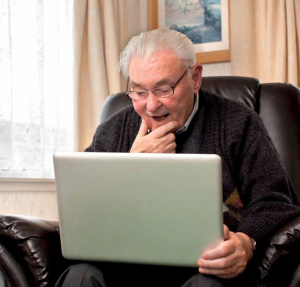For those of us who use digital tools and services regularly it is easy to forget that it is a skill. However if you’ve ever helped a relative set up their tablet or coached a grandparent through a skype call you may well have been annoyed by what seem like obvious questions, mistakes or repeated hesitations.
We take sending an email or searching for information on Google for granted but these are skills we had to learn. They are also skills that many people in the country don’t have.
Digital friends is a peer to peer learning scheme aimed at helping the 10.5 million people in the UK that lack basic digital skills. It is a civil service initiative but everyone can be a digital friend.

Being a digital friend can be as big or as small a commitment as you want. The Government Digital Service is working on digital inclusion at a national level but everyone can do their part by helping a friend, family member or neighbour.
You can also be a digital friend through your work whether that is making policy in a government department or in a care home. AgeUK have done some work about how to teach both staff and residents of care homes digital skills.
 Older people, disadvantaged people and disabled people make up the majority of those that lack basic digital skills and yet these are the people who stand to lose most from not being online. These are the people who could benefit from the community, advice, learning and employment opportunities that can be found online.
Older people, disadvantaged people and disabled people make up the majority of those that lack basic digital skills and yet these are the people who stand to lose most from not being online. These are the people who could benefit from the community, advice, learning and employment opportunities that can be found online.
The biggest barrier to getting people online is apathy so one of the most important tasks of the Digital Friend is to get people excited about the internet. People need to understand the scope of what they can do online – the creative things as well as the practical - and how it can enhance their lives. As a digital friend you can help them meet new people, learn a new skill, organise their money, do their shopping or just rewatch their favourite show or film.
By being digital friend you can show people how easy it is to do all these things. You can give people the basic skills to try out new ideas and expand their horizons from the comfort of their living room. Being online can give people the independence to organise their own lives and the freedom to develop their own communities unconstrained by geography or physical ability.
When I worked in a café over Christmas we were told to pay special attention to some of our older customers as we were likely to be their one social interaction that week. I got to know several of these customers over the months that I worked there. I was happy to listen to the details of their lives and tried my best to remember each one but I had to move on to the next customer. Ultimately I felt sorry for these people who clearly led isolated lives.
One way to tackle this problem would be to get these people online. It would provide them with so many more opportunities including meeting people both locally and abroad, finding nearby events and helping them to talk face to face with far flung family. It could even introduce them to each other so they could visit the café together. It would help to combat loneliness and depression and help older people stay independent for longer. That’s why I am a Digital Friend in the Department of Health.
So next time someone asks you a digital question don’t be annoyed if the answer seems obvious - consider being a digital friend and then tell us about it with #digitalfriends.
4 comments
Comment by Fiona posted on
Hi, I have been trying to get hold of someone in your department who can tell me a bit more information on the campaign and get some marketing materials to promote but no one seems to know anything about this campaign - whats the best contact.
Thanks
Fiona
Comment by Mark Osterloh posted on
Hi Fiona
Here's <a href="http://www.carewatch.co.uk/news/2015/september/17/doh-digital-friends-campaign/">a link</a> which should point you in the right direction
Thanks
Mark
Social Care News
Comment by Gerald Power posted on
broken links on this page. e-mail me if anyone ever reads this
geraldpower100@btinternet.com
Comment by Mark Osterloh posted on
Gerald - this blog post was published quite a while ago in September 2015. All links were checked and live at the time of publication. The majority of links are still active but it appears there are security issues with the digital skills website (a non DH concern) which is why two of the links no longer work. I will update the post. Thank you for letting us know
Mark - Social Care News Editor